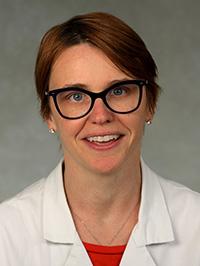Jessica Dine: Macy Faculty Scholar
 C. Jessica Dine, associate professor in the division of pulmonary, allergy and critical care, and director of assessment and evaluation in the department of medicine in the Perelman School of Medicine, has been named a Macy Faculty Scholar by the Josiah Macy Jr. Foundation. The New York-based program identifies and provides financial and other support to educational innovators in medicine and nursing.
C. Jessica Dine, associate professor in the division of pulmonary, allergy and critical care, and director of assessment and evaluation in the department of medicine in the Perelman School of Medicine, has been named a Macy Faculty Scholar by the Josiah Macy Jr. Foundation. The New York-based program identifies and provides financial and other support to educational innovators in medicine and nursing.
Dr. Dine joins the eighth class of Macy Faculty Scholars. This year’s group of five scholars, who are from nursing and medical schools across the country, will pursue mentored educational innovation projects at their home institutions. Dr. Dine will design and develop an assessment strategy for inter-professional collaboration in the clinical learning environment, which would appraise care providers from a number of health care professions delivering clinical care in real time. Judy A. Shea, associate dean for medical education research and a professor of medicine at Penn, will serve as Dr. Dine’s mentor for the initiative.
Dr. Dine’s strategy is based on the principle that teamwork is essential to delivering high- quality patient care in today’s complex health- care delivery system. Health-care professionals are regularly asked to take part in inter-professional education and collaboration in order to deliver more efficient and successful patient care. Ideally, a learner’s competence in caring for patients collaboratively should be assessed by direct observation of his or her use of best practices while providing care in an authentic clinical environment, but no such tool exists.
Dr. Dine plans to develop a tool to measure inter-professional collaboration skills of health-care providers in the clinical learning environment. She will assemble an interdisciplinary team of Penn-based experts to develop the assessment tool; it will comprise physicians; nurses; pharmacists; physical, respiratory, and occupational therapists; and social workers. The instrument will then be used to observe learners from each of the professions in different clinical settings during clinical rotations. Data on the observed learners, the complexity of their patients’ conditions and team members’ perception of conflict within the team will be collected to test the validity of the tool. Dr. Dine will also develop an electronic platform to collect data for future fine-tuning of the instrument.
